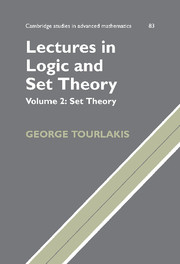VII - Cardinality
Published online by Cambridge University Press: 12 January 2010
Summary
In Chapter VI, among other things, we studied the WO sets and learnt how to measure their length with the help of ordinal numbers. A consequence of the axiom of choice was (Theorem VI.5.50) that every set can be well-ordered and therefore every set can be assigned a length.
In the present chapter we turn to another aspect of set size, namely its number of elements, or cardinality. It will turn out that for finite sets length and cardinality are measured by the same (finite) ordinal; thus, in particular, finite sets have a unique length. As was already remarked, the situation with infinite sets is much less clean intuitively, and several WO sets of differing lengths can have the same number of elements (e.g., ω, ω + 1, ω + 2, etc).
The following section will formalize the notions of “finite” and “infinite” sets. Intuitively, a set is finite if the process of removing its elements, one at a time, will terminate; it is infinite otherwise.
Thus for finite sets the process implicitly assigns the numbers 1, 2, 3,… to the first, second, third, … removed items. Since the process terminates, there will be a natural number assigned to the last removed item. Evidently this number equals the cardinality, or number of elements, of the set.
In the infinite case it is not clear a priori how to assign a “number” that denotes the cardinality of the set. Thus the issue is temporarily postponed, and one first worries about whether or not two infinite sets have the same number of elements.
- Type
- Chapter
- Information
- Lectures in Logic and Set Theory , pp. 430 - 517Publisher: Cambridge University PressPrint publication year: 2003



